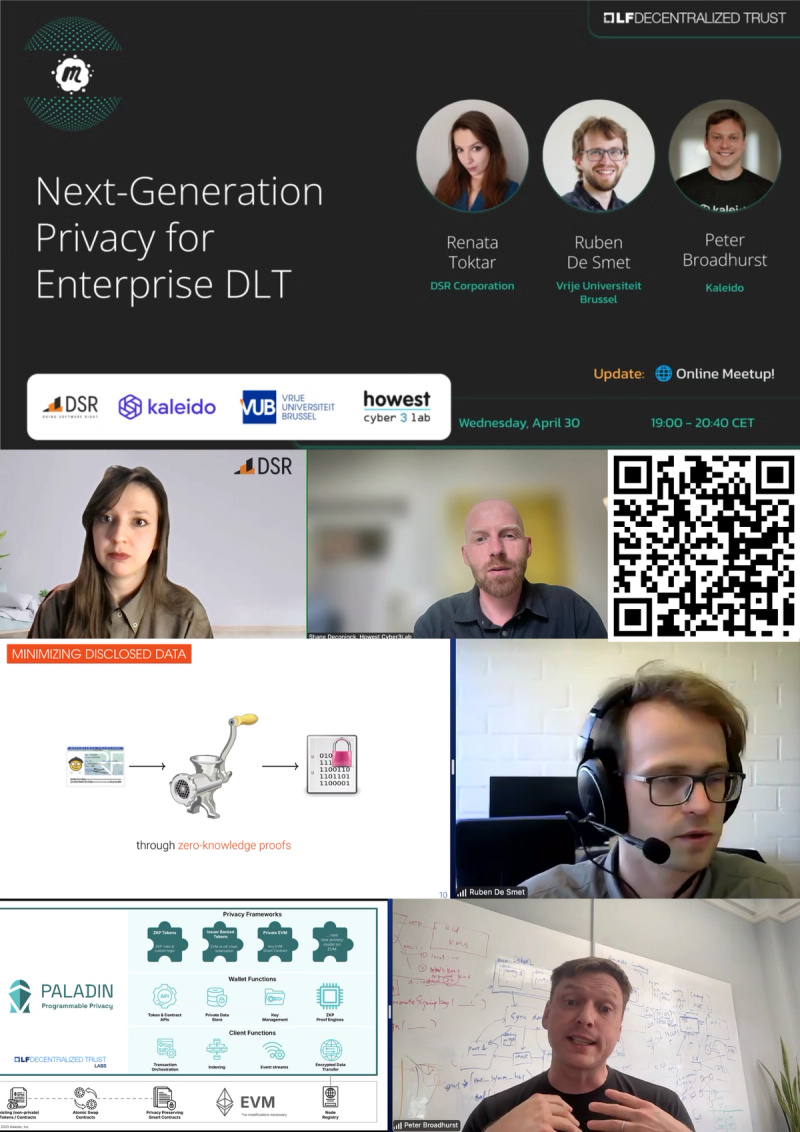Building the Next Generation of Privacy: Highlights from LFDT Belgium’s April 30 Meetup
Building the Next Generation of Privacy: Highlights from LFDT Belgium’s April 30 Meetup
On April 30, 2025, Howest Cyber3Lab brought the LFDT Belgium community together for a virtual meetup that showcased three practical ways to build privacy‑preserving decentralised applications. In just over 90 minutes, speakers from industry, academia and open‑source projects moved from self‑sovereign identity to zero‑knowledge proofs and, finally, programmable privacy on the Ethereum Virtual Machine (EVM).
Watch the recording on YouTube

Main section
Quick facts
/
The April 30 meetup, hosted by Howest Cyber3Lab for LFDT Belgium, featured three expert talks on decentralized identity, ZKPs, and EVM privacy.
/
Speakers included Renata Toktar (DSR Corporation), Ruben De Smet (VUB), and Peter Broadhurst (Kaleido).
What We Learned from Three Sharp Talks on Privacy and Decentralization
Renata Toktar – “Decentralized Identity: A Simple Way to Keep Your Privacy”
Renata Toktar of DSR Corporation
“Self‑sovereign identity means you are the only owner of your identity and your documents, no one can pretend to be you.”
“It is not just one direction, one tool or specification. It is a whole market, a whole set of different technologies and tools.”
“The holder doesn’t send the whole verifiable credential; it is always a proof, that’s the main idea.”
Renata opened the night by demystifying self‑sovereign identity (SSI). She reminded us that SSI is an ecosystem, not a single protocol, and that its value lies in the selective disclosure of verifiable credentials. With EU eIDAS 2.0 around the corner, her message was clear: now is the time for developers to start experimenting.
Why it matters
- Credentials stay on the user’s device; only cryptographic proofs travel over the wire.
- The approach dovetails perfectly with Europe’s upcoming digital‑wallet regulation.
Ruben De Smet – “Real-world Applications of Zero-knowledge Proofs”
Ruben De Smet from Vrije Universiteit Brussel
“Zero‑knowledge proofs are not necessarily specific for blockchain… everything I’m showing here is independent from whether you’re running a blockchain or not.”
“Take your identity card, put it in a big meat‑grinder we call a zero‑knowledge proof, and what comes out is any derived statement, like proving you’re over 18 without revealing anything else.”
“Mathematicians have proven that basically every statement in NP (meaning any problem whose solution can be quickly verified by a computer) has a zero‑knowledge proof.”
Ruben continued by plunging us into the world of zero‑knowledge proofs (ZKPs). His memorable demos drove home how ZKPs can transform compliance, mobility and even COVID certificates.
Why it matters
- ZKPs reveal nothing but the fact you’ve proven.
- Modern tooling (think Cairo or RISC Zero) lowers the entry barrier for non‑cryptographers.
Peter Broadhurst – “Advancing EVM Privacy: An Introduction to LFDT Lab Paladin”
Peter Broadhurst from Kaleido
“Paladin is about programmable privacy, powered by the EVM.”
“Everything you do in Paladin is really using the blockchain.”
“Paladin already supports three privacy patterns out‑of‑the‑box: private EVM mini‑chains, issuer‑backed tokens and ZKP‑based tokens.”
Rounding off the evening, Peter unveiled Paladin, an LFDT Lab that turns privacy patterns into live smart‑contract components. Instead of a side‑car network, Paladin works inside any Ethereum‑compatible chain, letting builders plug privacy straight into their existing stack.
Why it matters
- Developers can mix‑and‑match privacy patterns without modifying the base chain.
- A modular “domain” architecture means new cryptographic ideas can slot in later.

Bottom section
Key take‑aways
1 . Own your digital identity
Digital wallets that hold verifiable credentials put people - not platforms - in the driver’s seat. Expect this to become the default as EU eIDAS 2.0 rolls out.
2 . Prove it without oversharing
Zero‑knowledge proofs let you confirm a fact (like being over 18 or having settled a bill) without handing over all your personal data. Ideal for everything from ticketing to compliance.
3 . Privacy can be built‑in, not bolted‑on
Projects like Paladin show that mainstream blockchains can support private transactions and contracts while still offering the transparency decentralised systems thrive on.
Contributors
Authors
/
Shane Deconinck, Web3 Lead
/
Patrick Van Renterghem, AI, CyberSecurity, Web3, Immersive Tech, Quantum, ... Community Builder & LLL Coordinator
Want to know more about our team?
Visit the team page
Last updated on: 7/7/2025
/
More stuff to read




